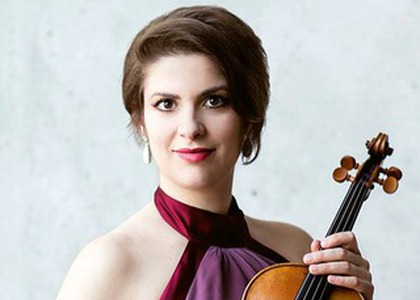> [Archived] Interviews

Interview with violinist Ioana Cristina Goicea
The musician is the soloist of the National Radio Orchestra's concert on Friday, the 15th of March. British conductor Kerem Hasan will conduct.
Ioana Cristina Goicea, how would you describe your relationship with the National Radio Orchestra?
It is a special relationship. I am invited to the radio almost every year and every time I feel the connection with the ensemble. I am very happy to hear that the orchestra is constantly growing and I can't wait for the concert on Friday evening, the 15th of March, with conductor Kerem Hasan.
With the conductor, you just had your first rehearsal. How would you describe your first collaboration with him?
Extraordinary, very intensive and I felt that we were both on the same wavelength with this work. I can say that we worked on exactly what I had imagined before this first meeting, and these things materialised exactly like that in the rehearsal, so it was a very good rehearsal.
What are the difficulties of Béla Bartók's violin concertos, especially the second one, which you will perform on Friday?
The two Bartók concertos are very different. The first concerto is written in his youth, much shorter, lyrical, has a completely different character, and the second concerto is a complex work, particularly difficult and beautiful. I find myself 100% in this music, when I play it I feel it is part of me.
What place does the composer's work have in your repertoire? How does Bartók approach the violin?
He always writes extremely difficult, but at the same time extremely well, whether we are talking about works for violin, other instruments or orchestral works. He never feels sorry, so to speak, for soloists and musicians. Technically, I feel great with this music. I think it's a work of contrasts, which excites me most about Bartók's music.
In January, at the MUSICRIT Awards Gala, the CD entitled "George Enescu", which you recorded with Daria Tudor and Andrei Ionițã, was named Record of the Year 2023. What does this award mean to you and how would you describe your collaboration with the two musicians?
It is a great honour for us to receive this award. Recording a CD is always work, quite different from playing a concert. It's a different kind of work, an ensemble work, a work with a lot of attention to detail, and this award means that our work is rewarded at the highest level. As far as the collaboration with Andrei Ionițã and Daria Tudor is concerned, I can say that we are like brothers, so practically a family.
What other events are on your agenda for the coming period?
You have really caught me in a particularly busy period. This week I'm here at the Sala Radio and next week I'll be in Japan for a tour of recitals and masterclasses. Directly from Japan, I'll be going to Germany for another tour, where I'll be performing the Brahms Concerto. After that tour there will be a few days of teaching in Vienna and then another tour, where I will be the soloist of the Beethoven Concerto, also in Germany. At the beginning of May I will have a recital with pianist Josu de Solaun in Spain, and in June I will be at the Naantali Festival in Finland for the first time, which is a very famous festival. Now, March, April, May and June, let's say until summer, are busy months for me, where I will be on the road a lot, in many countries.
Translated by Miruna-Gabriela Flipache,
University of Bucharest, Faculty of Foreign Languages and Literatures, MTTLC, year I
Corrected by Silvia Petrescu














